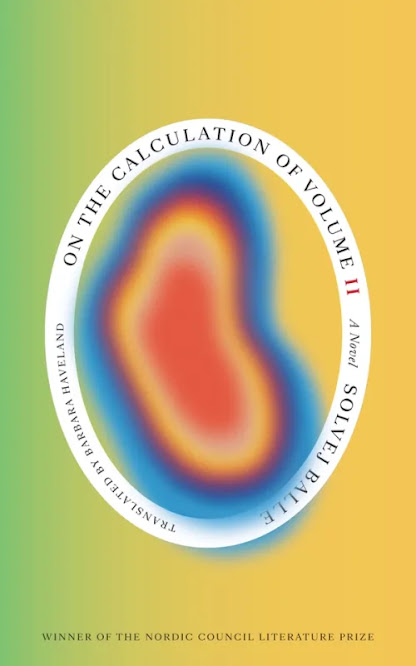Solvej Balle, On the Calculation of Volume
(Book I), Trans. by Barbara J. Haveland
2024
Utterly riveting, Solvej Balle’s On the Calculation of Volume (Book I) is the grand opening of her speculative fiction septology, winner of the 2022 Nordic Council Literature Prize (Scandinavia’s most important literary award) for being “a masterpiece of its time.”
Tara Selter, the heroine of On the Calculation of Volume, has involuntarily stepped off the train of time: in her world, November eighteenth repeats itself endlessly. We meet Tara on her 122nd November 18th: she no longer experiences the changes of days, weeks, months, or seasons. She finds herself in a lonely new reality without being able to explain why: how is it that she wakes every morning into the same day, knowing to the exact second when the blackbird will burst into song and when the rain will begin? Will she ever be able to share her new life with her beloved and now chronically befuddled husband? And on top of her profound isolation and confusion, Tara takes in with pain how slight a difference she makes in the world. (As she puts it: “That’s how little the activities of one person matter on the eighteenth of November.”)
Balle is hypnotic and masterful in her remixing of the endless recursive day, creating curious little folds of time and foreshadowings: her flashbacks light up inside the text like old flash bulbs.
The first volume’s gravitational pull―a force inverse to its constriction―has the effect of a strong tranquilizer, but a drug under which your powers of observation only grow sharper and more acute. Give in to the book's logic (its minute movements, its thrilling shifts, its slant wit, its slowing of time) and its spell is utterly intoxicating.
Solvej Balle’s seven-volume novel wrings enthralling and magical new dimensions from time and its hapless, mortal subjects. As one Danish reviewer beautifully put it, Balle’s fiction consists of writing that listens. “Reading her is like being caressed by language itself.”
Solvej Balle, On the Calculation of Volume
(Book II). Trans. by Barbara J. Haveland, 2024
Tara Selter’s epic journey through November 18th continues in Book II of the masterly On the Calculation of Volume from one of Scandinavia’s most beloved writers.
The first year of November eighteenth is coming to a close, and Tara Selter has returned to her hotel room in Paris, the place where it all began. As if perched at the edge of a precipice, she readies herself to leap into November nineteenth.
Book II of Solvej Balle’s astounding seven-part series On the Calculation of Volume beautifully expands on the speculative premise of Book I, drawing us further into the maze of time, where space yawns open, as if suddenly gaining a new dimension, extending into ever more fined-grained textures. Within this new reality, our senses and the tactility of things grows heightened: sounds, smells, sights, objects come suddenly alive, as if the world had begun whispering to us in a new language.
And yet as the world announces itself anew, Tara’s own sense of self is eroding, making her wonder just which bits of her are really left intact? “It is the Tara Selter with hopes and dreams who has fallen out of the picture, been thrown off the world, run over the edge, been poured out, carried off down the stream of eighteenths of November, lost, evaporated, swept out to sea.” She begins to think of herself as a relic of the past, as something or someone leftover, similar to the little Roman coin she carries around in her pocket, without a purpose or a place.
Desperate to recover a sense of herself within time, Tara decides to head north by train in search of winter, but soon she turns south in pursuit of spring, as she tries to grasp on to durational time through seasonal variations. Amazingly, On the Calculation of Volume Book II is all movement and motion―taking us through the European countries of the North and the South, through seasons, and languages―a beautiful travelogue that is also a love letter to our vanishing world. To be continued.



No comments:
Post a Comment
Note: Only a member of this blog may post a comment.